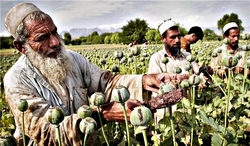 Iranian Parliament Speaker Ali Larijani lashed out at the US destructive role in the region, adding that opium production in Afghanistan has sharply increased in the last 18 years since the US attack in 2001.
Iranian Parliament Speaker Ali Larijani lashed out at the US destructive role in the region, adding that opium production in Afghanistan has sharply increased in the last 18 years since the US attack in 2001. “The US intervention creates problems for the Middle East region,” Larijani said during the meeting.
The top Iranian legislator also said "about 4,000 Iranians have been martyred during the fight against illegal drugs, while since 2001, when Americans attacked Afghanistan, drug production has increased by 50 times in the neighboring country."
Larijani further said that Iran will remain alongside Iraq as it did during the fight against terrorism.
According to Fars News Agancy, Bashir Haddad, for his part, said that long shared borders between Iran and Iraq lay the ground for expansion of ties between the two countries in various fields, stressing the need for an increase in the number of border crossings to expand bilateral economic and trade relations.
The US military operation in Afghanistan began in 2001, as a part of then-US President George W. Bush's "War on Terror" following the 9/11 attacks. The operation swiftly ousted the Taliban government, but despite that, the group retains control over the majority of Afghan territory. The intervention also failed to thwart Afghanistan's production of opium, which reached a record level of 9,000 metric tons in 2017, according to a Brookings Institution report. Afghanistan is currently the world's leading opium producing country, according to the United Nations Office on Drugs and Crime monitoring.
The Iranian police officials maintain that drug production in Afghanistan has undergone a 40-fold increase since the US-led invasion of the country in 2001.
Afghan and western officials blame Washington and NATO for the change, saying that allies have "overlooked" the drug problem since invading the country more than 16 years ago.
847/940